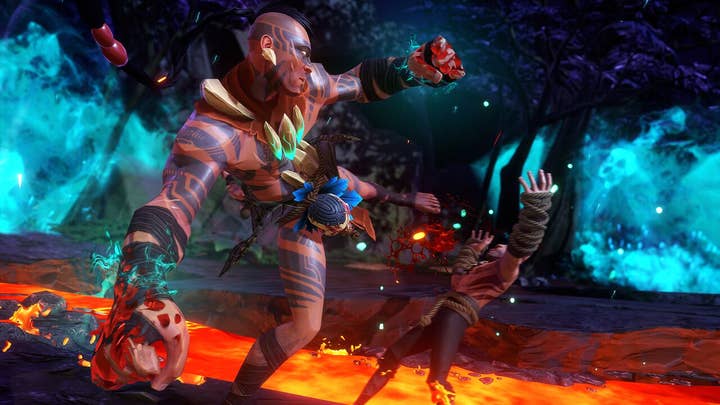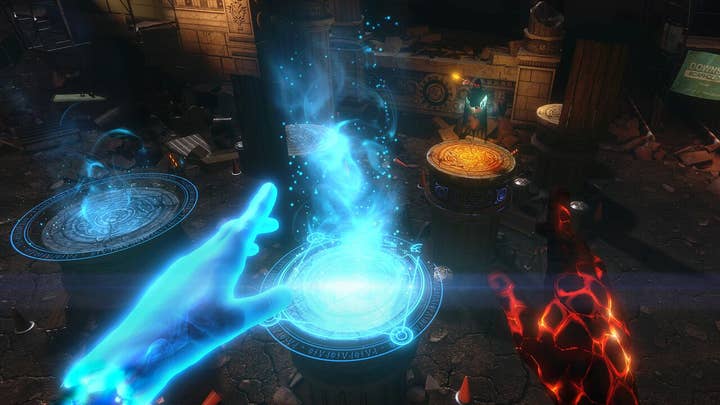Why Insomniac is committing to VR
Ted Price discusses his studio's plan to release three VR games this year, including two just-announced exclusives for Oculus Rift
Many big name developers are taking a wait-and-see approach to supporting the first wave of virtual reality headsets, but Insomniac is jumping in head first. The studio today announced that it has agreed to create a pair of exclusive games for the Oculus Rift: a third-person adventure brawler called Feral Rights (due this fall), and a first-person player-vs-player magician dueling game called The Unspoken (releasing this holiday season). That's in addition to its previously announced VR adventure Edge of Nowhere (expected this spring).
Speaking with GamesIndustry.biz last week, Insomniac founder and CEO Ted Price explained why his studio has embraced VR so quickly.
"For us, this is an opportunity to develop a design expertise that helps us flex our creative muscles more than probably any time in the recent past. We're addressing some really interesting and unexpected challenges within VR. One of the major attractions for us has been to try new things, to be on a platform where you really have to innovate constantly to produce compelling content."
"The number one challenge we have wrestled with is how to design camera, character control, and spaces that work well in VR."
As Price explained, not innovating simply isn't an option in VR, where many design decisions developers might take for granted have to be rethought not only because players can look where they like and have access to new interfaces like Oculus Touch.
"The number one challenge we have wrestled with is how to design camera, character control, and spaces that work well in VR," Price said. "The reason it was a challenge for us, even though we consider ourselves very experienced in each of those categories, is that in VR, the camera is generally you. The rules for, say, third-person action end up being very different when the player's head is the camera. So in terms of how we design the space, what we do with lateral movement or movement back towards the camera, what we do with camera shakes, or little subtle motions of the camera, they all become very big issues to grapple with when we're laying out a game like Edge of Nowhere."

The Unspoken presented similar challenges, not just because it was in VR, but by virtue of being a first-person game where players compete against one another in an arena setting.
"There are always a lot of things you have to consider with PvP," Price said. "It's somewhat different in that your tendency as a player to look around is heightened when you're in VR. So it gives the other player more opportunities to nail you when you're not looking. It changes how we design our spells and the battlefield as well, because players don't tend to act the same way they do in a more traditional 2D (monitor) game. As far as the spellcasting mechanics go and timing, that all comes down to a lot of experimentation and getting people in the game, watching them carefully and asking them questions about whether or not it felt good to, say, cast a fireball, or whether it was difficult for folks to target an enemy without making it feel too easy."
Tackling these sorts of problems now isn't just good creative exercise for Insomniac's developers; Price also hopes it will have them ahead of the curve for what he sees as VR's promising future.
"[VR] may not explode immediately, but we think it's here to stay."
"We look at VR as another branch of the industry that is being born now and will continue to grow," Price said. "It may not explode immediately, but we think it's here to stay. And I think when you see the participation of absolutely massive companies like Facebook in this field, it's hard to say it won't stay and have major influence on our culture as we progress."
While Feral Rights and The Unspoken will be exclusive to Rift, Insomniac owns the intellectual property, so Price said if they decide to do sequels, they could be released on other platforms. But you probably shouldn't expect preorders for non-VR versions of the games--or Edge of Nowhere, for that matter--to open up anytime soon.
"I think we'd have to make major changes," Price said. "These games are designed from the beginning for VR, and much of the gameplay relies on the player's use of, in Unspoken's case, the Touch controller, and in all three games, the player's complete control of the camera by looking around. Some of our gameplay challenges are built around the idea that you're peering around objects, or you're looking up or down, and a lot of the emotional charge that we create in these games come from us putting you in situations where VR really helps amplify the player's experience."

When asked if Price thinks such concerns will prevent publishers from releasing VR and non-VR versions of the same game in the future, Price suggested there are opportunities there, just not ones currently being explored, and perhaps not ones Insomniac would likely pursue.
"VR, even with a traditional game, provides almost an infinitely large screen for players."
"I'm going to rip off something I heard Jason Rubin say yesterday. VR, even with a traditional game, provides almost an infinitely large screen for players," Price said. "And if you think about what you can see inside a headset, the experience when it comes to playing a more traditional game can really be enhanced when you have it running in a VR headset down the road. But I'm talking about the future, and that's just traditional games going to VR.
"My feeling is that as designers, we get passionate about using VR for what it's good at doing, and that's putting players in the experience, and creating sound effects, character interactions or environments that heighten that feeling that you are there. That's a fun place to be as a creative, and if we design a game here at Insomniac, we take the platform into consideration very strongly. And we try to make sure that the game's design is built for that particular platform."









